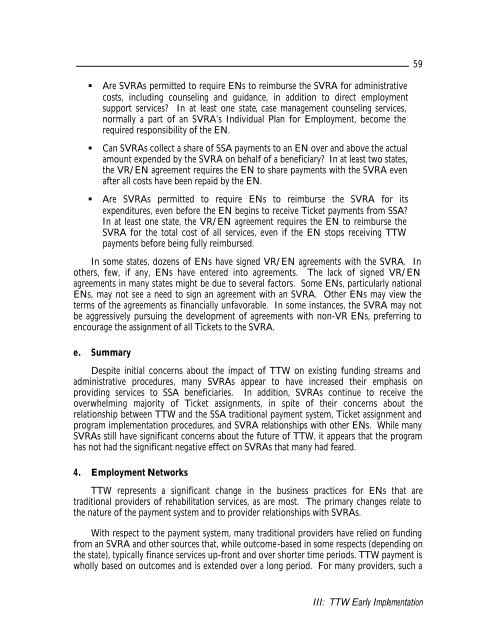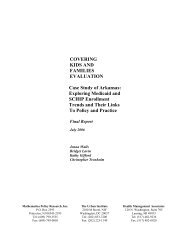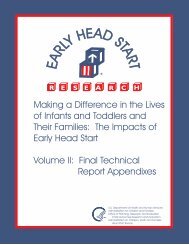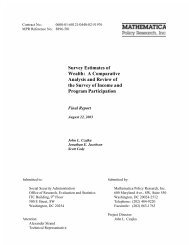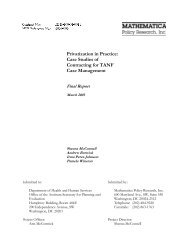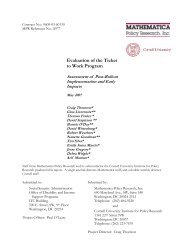Evaluation of the Ticket to Work Program Initial Evaluation Report
Evaluation of the Ticket to Work Program Initial Evaluation Report
Evaluation of the Ticket to Work Program Initial Evaluation Report
Create successful ePaper yourself
Turn your PDF publications into a flip-book with our unique Google optimized e-Paper software.
59<br />
• Are SVRAs permitted <strong>to</strong> require ENs <strong>to</strong> reimburse <strong>the</strong> SVRA for administrative<br />
costs, including counseling and guidance, in addition <strong>to</strong> direct employment<br />
support services? In at least one state, case management counseling services,<br />
normally a part <strong>of</strong> an SVRA’s Individual Plan for Employment, become <strong>the</strong><br />
required responsibility <strong>of</strong> <strong>the</strong> EN.<br />
• Can SVRAs collect a share <strong>of</strong> SSA payments <strong>to</strong> an EN over and above <strong>the</strong> actual<br />
amount expended by <strong>the</strong> SVRA on behalf <strong>of</strong> a beneficiary? In at least two states,<br />
<strong>the</strong> VR/EN agreement requires <strong>the</strong> EN <strong>to</strong> share payments with <strong>the</strong> SVRA even<br />
after all costs have been repaid by <strong>the</strong> EN.<br />
• Are SVRAs permitted <strong>to</strong> require ENs <strong>to</strong> reimburse <strong>the</strong> SVRA for its<br />
expenditures, even before <strong>the</strong> EN begins <strong>to</strong> receive <strong>Ticket</strong> payments from SSA?<br />
In at least one state, <strong>the</strong> VR/EN agreement requires <strong>the</strong> EN <strong>to</strong> reimburse <strong>the</strong><br />
SVRA for <strong>the</strong> <strong>to</strong>tal cost <strong>of</strong> all services, even if <strong>the</strong> EN s<strong>to</strong>ps receiving TTW<br />
payments before being fully reimbursed.<br />
In some states, dozens <strong>of</strong> ENs have signed VR/EN agreements with <strong>the</strong> SVRA. In<br />
o<strong>the</strong>rs, few, if any, ENs have entered in<strong>to</strong> agreements. The lack <strong>of</strong> signed VR/EN<br />
agreements in many states might be due <strong>to</strong> several fac<strong>to</strong>rs. Some ENs, particularly national<br />
ENs, may not see a need <strong>to</strong> sign an agreement with an SVRA. O<strong>the</strong>r ENs may view <strong>the</strong><br />
terms <strong>of</strong> <strong>the</strong> agreements as financially unfavorable. In some instances, <strong>the</strong> SVRA may not<br />
be aggressively pursuing <strong>the</strong> development <strong>of</strong> agreements with non-VR ENs, preferring <strong>to</strong><br />
encourage <strong>the</strong> assignment <strong>of</strong> all <strong>Ticket</strong>s <strong>to</strong> <strong>the</strong> SVRA.<br />
e. Summary<br />
Despite initial concerns about <strong>the</strong> impact <strong>of</strong> TTW on existing funding streams and<br />
administrative procedures, many SVRAs appear <strong>to</strong> have increased <strong>the</strong>ir emphasis on<br />
providing services <strong>to</strong> SSA beneficiaries. In addition, SVRAs continue <strong>to</strong> receive <strong>the</strong><br />
overwhelming majority <strong>of</strong> <strong>Ticket</strong> assignments, in spite <strong>of</strong> <strong>the</strong>ir concerns about <strong>the</strong><br />
relationship between TTW and <strong>the</strong> SSA traditional payment system, <strong>Ticket</strong> assignment and<br />
program implementation procedures, and SVRA relationships with o<strong>the</strong>r ENs. While many<br />
SVRAs still have significant concerns about <strong>the</strong> future <strong>of</strong> TTW, it appears that <strong>the</strong> program<br />
has not had <strong>the</strong> significant negative effect on SVRAs that many had feared.<br />
4. Employment Networks<br />
TTW represents a significant change in <strong>the</strong> business practices for ENs that are<br />
traditional providers <strong>of</strong> rehabilitation services, as are most. The primary changes relate <strong>to</strong><br />
<strong>the</strong> nature <strong>of</strong> <strong>the</strong> payment system and <strong>to</strong> provider relationships with SVRAs.<br />
With respect <strong>to</strong> <strong>the</strong> payment system, many traditional providers have relied on funding<br />
from an SVRA and o<strong>the</strong>r sources that, while outcome-based in some respects (depending on<br />
<strong>the</strong> state), typically finance services up-front and over shorter time periods. TTW payment is<br />
wholly based on outcomes and is extended over a long period. For many providers, such a<br />
III: TTW Early Implementation


